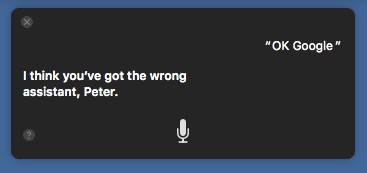I’ve currently got five speech-recognizing digital assistants in my life: an Amazon Echo Dot in the living room at home, in the office a Google Home, along with a MacBook Air and an Apple TV (both with Siri), and Google Assistant running on the Android phone in my pocket.
This leads to some confusion as I go about my day: saying “OK Google” to Siri, for example, or “Alexa, ask City Cinema what’s playing tonight” to my Google Home.
At least Siri has a sense of humour about it:

Each of these assistants does different things.
Sometimes they can do the same thing.
And sometimes the results of the same thing are the same, and sometimes they’re different.
Turn on the television
For example, both the Echo Dot and Google Assistant can control the television and lamp in our living room at home, via a paired Wemo Switch. And so when I’m sitting on the couch I can say either “Alexa, turn on the television” or “OK Google, turn on the television” and the television will turn on (I default to Alexa because I don’t have to remember whether it’s nearby or not; it’s fixed in one place, whereas my phone could be out of earshot).
Send a text to Catherine
In the office, my Google Assistant often sits, plugged in, inches from my Google Home. You might think that they share a common brain on the back end, and it’s clear that they have some knowledge of each other. But custom “Google Actions” that I’ve developed only work on the Google Home and not in Google Assistant, whereas an attempt to say “OK Google, send a text to Catherine Miller,” in the office will, more often than not, result in “sorry, I can’t send texts yet” from the Google Home, even though the phone it shares a brain with is sitting right beside it, and the phone certainly can send texts.
What’s the capital of Alabama?
If I ask Siri on the Apple TV “What’s the capital of Alabama?”, it tells me “I can’t help you with that,” whereas Siri on my MacBook Air tells me it’s Montgomery.
The Echo Dot gives me Montgomery too, as do Google Home and Google Assistant.
If I follow up with “What’s the population?”, both Google Home and Google Assistant tell me the population of Alabama whereas Siri on my MacBook Air gives me the population of Montgomery (which seems like the right answer to a follow-up like this). The Echo Dot doesn’t understand follow-up questions, and so responds “Sorry, it looks like I didn’t hear you correctly.”
Who’s the Star of the Blacklist?
If I ask Siri on my Apple TV “Who is the star of the Blacklist?”, it first asks me which Blacklist (showing me thumbnails of four options), and when I select the current TV show, it shows me a list of stars, starting with James Spader. Asking the same question of Siri on my MacBook Air opens up iTunes and takes me to the Blacklist page, but doesn’t tell me the star.
Google Assistant and Google Home both answer “James Spader, Megan Boone, and 20 others” while my Echo Dot answers “Jason Butler Harner, Harry Lennix, Campbell Scott, Isabella Rossellini”, all of which have been guest stars, but none of which would be considered “the star” of the show.
What’s the Weather for Tomorrow?
Siri on both the Apple TV and the MacBook Air tell me “it doesn’t look so nice tomorrow, down to -3 degrees” when I ask “What’s the weather for tomorrow?”
Google Home says “cloudy with a high of 4 and a low of -2”, and the Echo Dot tells me to look for “intermittent clouds with a high of 4 and a low of -1”.
So I know it’s going to be -3 degrees tomorrow.
Or -2. Or -1.
Compuserve 2.0
We’re back to the days of Compuserve and AOL and Prodigy; pre-Internet when you dialed into a service provider’s walled garden, used its own peculiar user interface, and communicated only with other users of the same service.
Can you imagine if Firefox, Chrome, and Safari each had a different way of entering a URL. Or were only able to access certain sections of the Internet.
That’s where we’re at with digital assistants: there’s no openness, no interoperability (“Siri, tell my Google Home to close the garage door”, “Alexa, install Skype on my MacBook Air” – nope).
As someone who’s built an entire career on the back of open source and open standards, this is a disturbing trend.
And as someone charged with providing the curious with important information, a bleak landscape of maintaining code branches for each service’s particular way of working isn’t something I’m excited about.
I can’t imagine that we’re going to give over our future to a single provider of hardware, software and services–Google, Apple nor Amazon appear in danger of giving up this game–and so surely we would all benefit (and by “we”, I mean users) from requiring our devices to use open standards, to work with each other, and to leverage the network and its etiquette as we’ve done elsewhere.
Otherwise I’m going to be 70 years old and locked in the back yard because I can’t remember whether to say “Hey Siri,” “OK Google” or “Alexa” to unlock the door.
 I am
I am
Add new comment